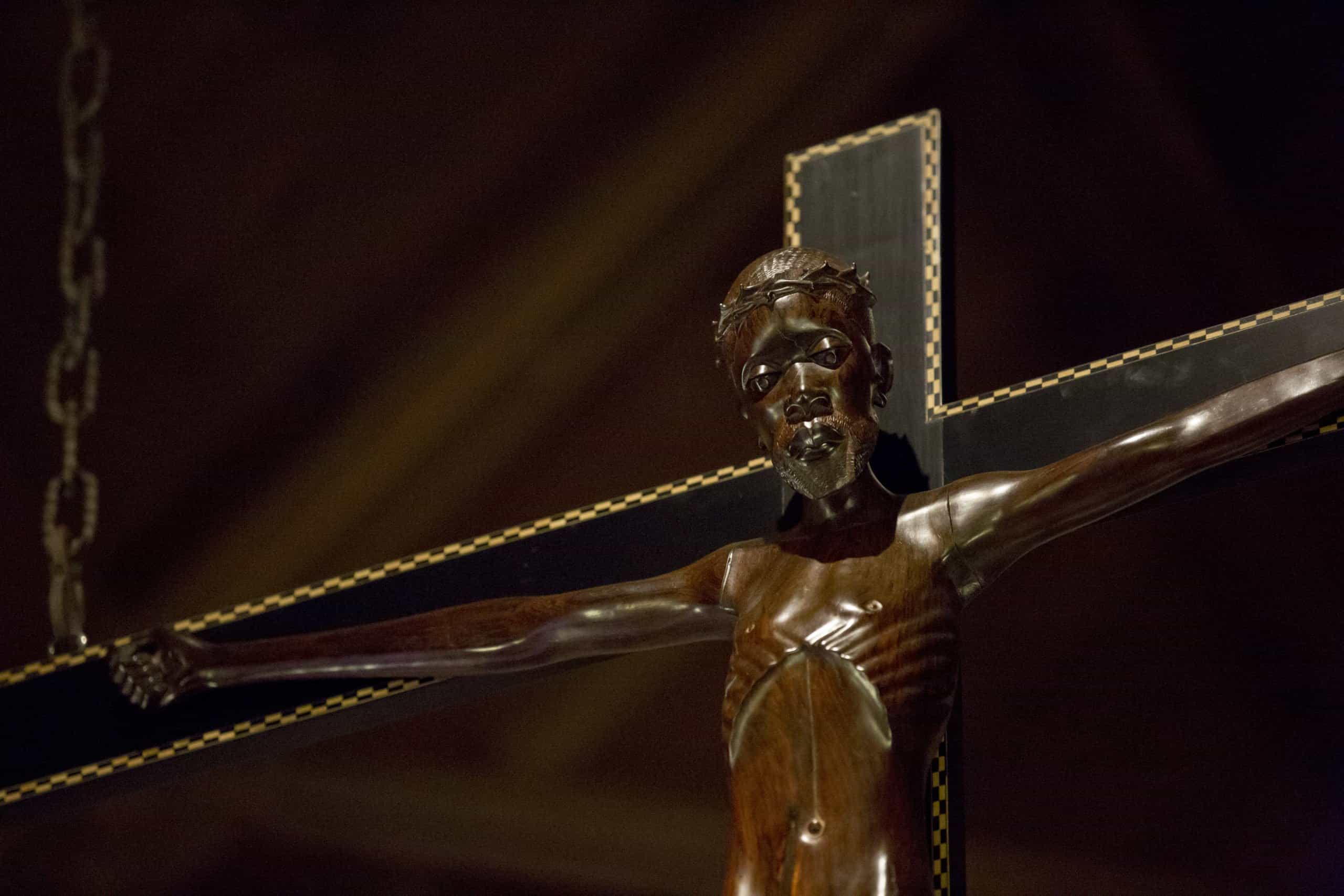*Warning: This piece contains significant racist language*
In 1967, Superior General Fr. Pedro Arrupe, SJ, wrote a letter to the American Jesuits calling them to task for their collective inaction on racism. Arrupe stated, “The racial crisis involves, before all else, a direct challenge to our sincerity in professing a Christian concept of man.” Arrupe’s subsequent critique of the American Jesuits was sharp. Arrupe observed that Jesuits failed to work in, support, or worship with Black communities. He identified some causes of this inadequacy of Jesuits to truly live their faith: acceptance of stereotypes, insulation from poverty and the poor, and conforming to the wider white community’s discrimination against People of Color.
As we celebrate Black History Month, I am led to reflect on difficult questions about Jesuits and race. American Jesuit history reflects much of that of American Catholicism as a whole. I believe examining this history provides critical self-reflection for Jesuits and Jesuit collaborators, as well as address how we might begin reconciling the grievous sin of racism as a broader society.
Questions of slavery and reparations have rightly occupied much of the discussion about Jesuits and race over the last several years. However, we as Jesuits and the wider American Church have frequently failed to address racism between slavery and the present. Dr. Shannen Dee Williams has begun popularizing #BlackHistoryIsCatholicHistory in response to the broad exclusion of Black individuals and communities from broader Catholic history. Her work, among many other scholars, has spurred me to ask: How have Jesuits excluded Black Catholics and Black Catholic history from the Jesuits’ own story?
*******
As part of a course on Jesuit history, I began researching what Jesuits have said about race and racism. I largely relied on The Woodstock Letters, an internal-only periodical that provided updates on and reflections by American Jesuits for almost 100 years. While I recognize the danger of again excluding the voices of People of Color, I would like to offer quotes from four white Jesuits with an accompanying explication of how their thought impacts us today.
Reaction to Arrupe’s letter, 1968
Jesuit involvement in race relations is not new; its history is marked by Peter Claver and John LaFarge. It is marked as well by slave holdings and segregated schools. Through the centuries our treatment of the Negro in this country has been conditioned by the times; we were no better and no worse — and this perhaps is a terrible indictment.
Richard Blake, then editor of America Magazine, compiled a series of responses to Arrupe’s letter. His assessment is, I believe, spot on–we as Jesuits were no better or worse, reflecting the times and culture of America, as well as Catholic culture. In the Woodstock Letters, Jesuits espoused many of the same beliefs as their fellow white Americans. Some letters spoke of the need for greater missionary focus on “our own” already-Catholic immigrants. Other letters spoke of the type of Black man that deserved lynching. Some decried fellow Jesuits for subscribing to pop-science and eugenics. Blake provides an initial step in reconciliation–admitting failure and sin. The hierarchy of the Church in America has historically been and is presently overwhelmingly white, as has been the body of the Church for much of its history. In many ways, the Church, then, must reconcile to itself and to each other, as well as the broader American community.
As a consequence while not neglecting the negro, Father Price is devoting most of his efforts, money, and energy, to reclaiming the white population. This once assured, this once accomplished, the negro’s conversion will offer little difficulty and its permanency will be much more assured. On the question of colored priests, Father Price maintains that they will be obnoxious to the white people and will by no means be acceptable to the Blacks who always look up with more respect to the white minister than to the minister of dusky hue.
Jesuit JH O’Rourke and future Maryknoll priest Thomas Price worked together as missionaries in North Carolina. They shared a widely-held belief that People of Color would eventually follow the “civilized” example of white people (whether willingly or by force). Their statement points to a clear problem: we, the Jesuits, refused to recruit Black men. While the order may not have had a written rule of rejecting Black men, we relied on racist cultural norms and outcomes. This letter and several other articles argued that Black Catholics were simply incapable and too lowly to become Jesuits. For decades, vocations primarily came from Jesuit high schools that were almost entirely white, leading wittingly or not to an exclusion of Black vocations. For example, when asked why he chose not to enter the Jesuits, theologian Fr. Bryan Massingale replied, “Because you never asked me.”
These norms have self-perpetuated, with the result of an American Society of Jesus that does not reflect the diversity and beauty of the Church it serves. In recent years, Jesuits in formation have begun pursuing anti-racism learning and actions, including addressing the dearth of vocation promotion among Catholics of Color. Province administrations have also begun to take action. In reconciliation, we are often asked to consider how we will seek forgiveness of those we have harmed, as well as create steps to prevent such harm in the future. Our repentance must be one of concrete action.
History of the Maryland Farms, 1912
In this article I will tell about the ‘Jesuit Negroes’ in Maryland. They were slaves, but were called servants, and they had some standing in the community, because they were the “the priests’ niggers,” and every black man in the neighborhood just longed to be one of them.
The history and knowledge of Jesuits owning slaves is clearly by no means new. Yet, just as other slaveholders after abolition, we have historically whitewashed the owning and treatment of slaves. The Jesuits had written rules about the treatment and selling of slaves, but most evidence points to these rules going ignored. Over the years, we Jesuits attempted to make our slaveholding activity seem pure, just, and justified. To claim to be an exemplary slave master is misleading, disingenuous, and sinful.
Recent endeavors to reconcile with the descendents of Jesuit-held slaves are incredibly important and a shift in both attitude and action. Truth-telling is a core component of this reconciliation. Research at Georgetown, St. Louis University, and the Slavery, History, Memory and Reconciliation Project are in their initial steps in both laying a groundwork and undoing our false narrative. I hope that these efforts lead to our repentance for both the slavery and the false narratives that have hidden our history. Moreover, I hope they lead to similar efforts to address false narratives about modern racism.
Summer School of Catholic Action, 1932
Another interesting phase of the Summer School which cannot be passed over in silence is the place that the Sodality freely tenders to the negro. Two negresses were present, representing parish Sodalities in St. Louis and in Chicago. Both were accorded friendly welcome by the faculty and students of the school. The Sodality did not fear to offer an encouraging and sympathetic hand to this oppressed race, in an earnest effort to help solve its religious and social problems.
In 1931, the Jesuits hosted their first Summer School of Catholic Action (SSCA), a two-week training on Catholic theology, the Spiritual Exercises, and Catholic Social Order.1 The SSCA hosted over 500 attendees in St. Louis, then a hotbed of Jesuit activity regarding economic justice. While the SSCA was an excellent start to teaching and pursuing justice it was not the broad coalition for racial justice that many Jesuits support today. It relied only on the philosophical and theological tradition of the Church and missed the opportunity to incorporate the perspectives of Black leaders, both Catholic and from other traditions.
The Jesuit commitment to justice is a hallmark of our lives and works today. Yet it can be difficult to examine the historical shortcomings of these justice efforts. Do we listen to all the voices, particularly those most impacted? Do we over-commit to ideologies to the detriment of our own efforts? Do we treat individuals and communities as problems to be solved, or beloved children of God?
*******
In the last decade, research regarding Jesuit slaveholding has garnered renewed attention and interest. There is a temptation in the Jesuits and broader American society, however, to say that the sins of slavery and racism no longer affect us. This notion feeds the false ideology that we are a post-racial society. We are not a post-racial society – white Americans and (parts of) the Catholic Church have benefited from centuries of white privilege that has not been reconciled or rectified.
While slavery is an obvious sin among Jesuit works, our communities and institutions must examine it as part of a broader conversation as to how racial injustice built the American Jesuits, as well as the Catholic Church in America. How have our institutions benefited from unfair housing practices? Unjust labor practices? Unequal educational opportunities? How did our theology foster white supremacy and privilege? How do our institutions presently benefit from these?
Jesuits and Jesuit works do a great deal of excellent work fighting injustice; but we often fail to address injustice’s roots within our own hallways and buildings. Jesuits and American Catholics must have difficult conversations about the very real and deeply-rooted impacts of racism. We must be willing to elucidate this history, even when it is painful for ourselves and those people and institutions we love. Only by studying our history can we move toward reconciliation and understand our best course today.
- What we today call Catholic Social Teaching was then coming to be called Social Order, popularized in the encyclical Quadragesimo Anno. ↩


